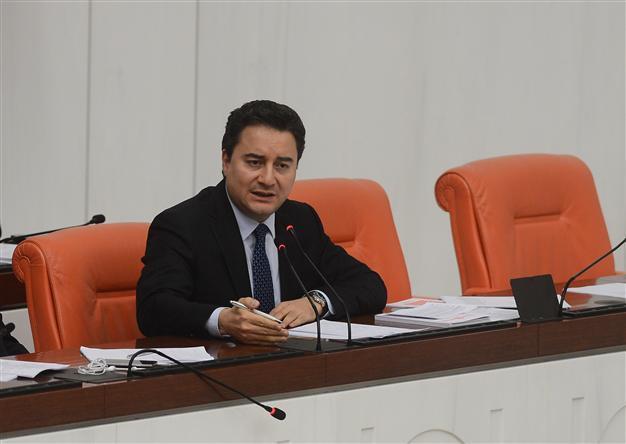Turkey guilty of dragging feet on EU accession reforms: Deputy PM Babacan
ISTANBUL – Anadolu Agency

Deputy Prime Minister Ali Babacan’s statements came amid an increasing rift between Ankara and Brussels over the Turkish Parliament’s adoption of separate laws on the Internet and the judiciary. AA Photo
Deputy Prime Minister Ali Babacan has harshly criticized Ankara’s shortcomings in Turkey’s EU accession bid, noting that the country was now reaping what it had sowed for “dragging its feet” on mandatory reforms.
“In the last 11 years [since the present government came to power], we dragged our feet on some issues the EU wanted us to regulate or said it would be good if we did. Those issues we did not take bold steps on in the past have come back to bite us in the end,” Babacan said Feb. 17 during an interview on private broadcaster NTV.
“One example is the State Security Courts [DGM]. We abolished those as part of the accession process but established specially authorized courts [ÖYM] instead. Now, those have created problems, and we are [currently] abolishing them,” he said, urging both the government and the opposition to stand together when it comes to EU reforms.
“I think that we should be bold when it comes to EU reforms. And the opposition should be bold, too, hence we did not get any support from them on reforms except for the first two years. They should do this for the sake of our nation and country,” Babacan said.
Babacan’s statements came amid an increasing rift between Ankara and Brussels over the Turkish Parliament’s adoption of separate laws on the Internet and the judiciary that have triggered a widespread outcry on the grounds that both would curb individual rights and freedoms.
He argued that the EU was still a compass for Ankara, in the absence of which Turkey would “lose its north.” “[Losing the EU] is very risky. The way political reforms will evolve within a country is very important when you consider it in the long term. There are so many countries that call themselves a democratic republic, but have nothing to with democracy,” Babacan said.
No crisisBabacan, meanwhile, brushed aside the fall of Turkish Lira and the country’s worsening economic prospects in the wake of the December 2013 graft probes, implicitly hailing the Central Bank’s recent decision to hike interest rates, a move which was repeatedly criticized by Prime Minister Recep Tayyip Erdoğan.
“Fortunately, currently there is no crisis in Turkey. [There is] no situation that will require general resolution packages either. We have gone through a period in which the markets have been fluctuating. But both due to the international situation and the steps undertaken by the Central Bank, fluctuations have decreased,” he said.
Babacan also stressed the importance of trust in the market, which he described as key for investments.
“The most important element regarding trust is the legal framework, meaning the health of the legal system and a market economy that has rules. It has to be based on equality of opportunities and everyone should trust justice. In other words, we have to make [investors] say: If I do business in this country, they will be fair to me, nobody will get priority, there will be no discrimination, the rules will be applied,” Babacan said.
Standard’s and Poor’s recently decided to cut Turkey’s credit outlook from stable to negative, arguing that it observed risks of a hard economic landing and that the country’s policy environment was becoming less predictable.
